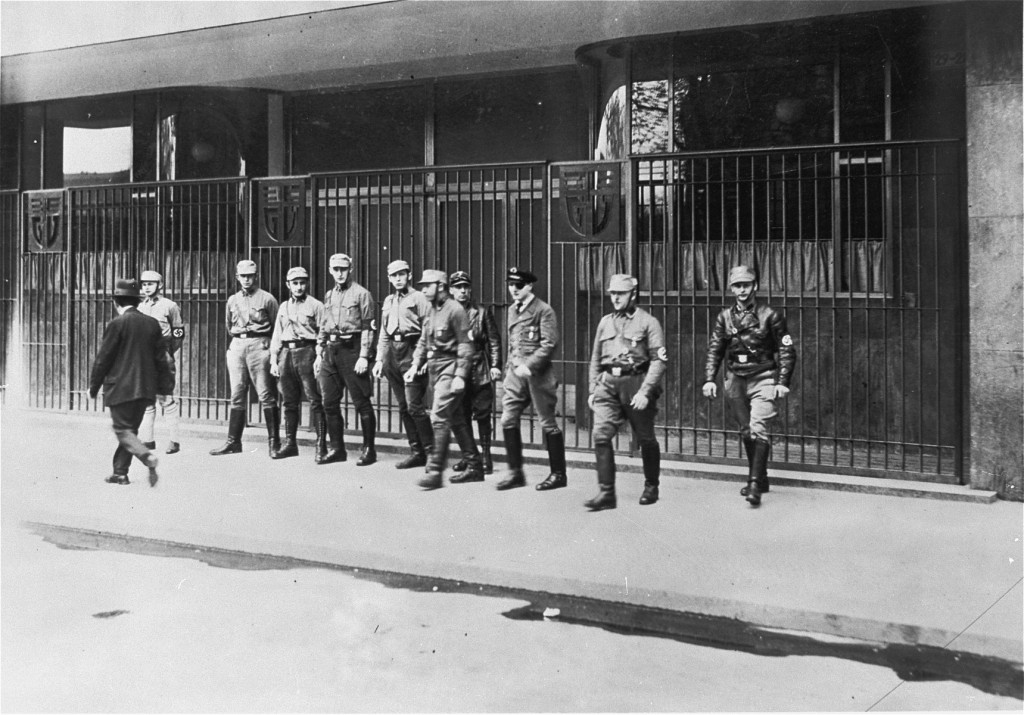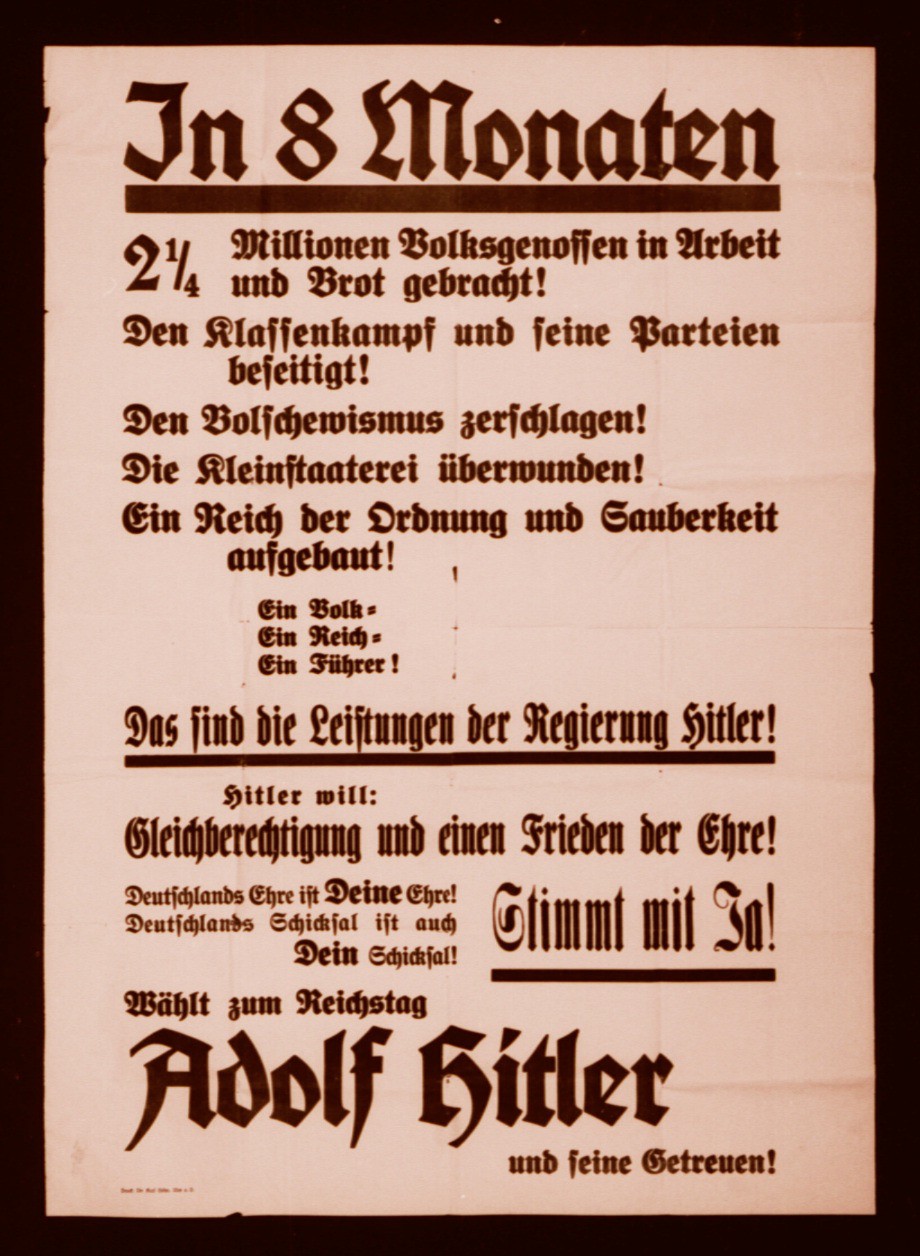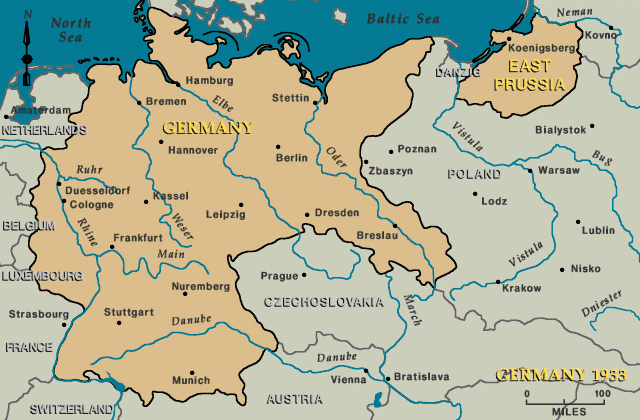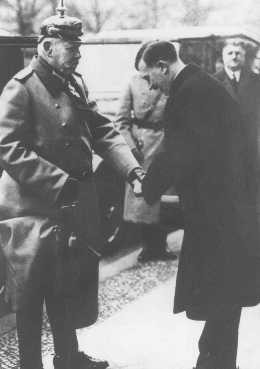
Nazi Rule
Nazi rule in Germany began with Hitler's rise to power in 1933. Hitler and the Nazi Party quickly eliminated democratic freedoms. The new regime then took control of all aspects of public life in Germany.
Adolf Hitler was appointed chancellor of Germany on January 30, 1933, bringing an end to German democracy. Guided by racist and authoritarian ideas, the Nazis abolished basic freedoms and sought to create a "Volk" community. In theory, a "Volk" community united all social classes and regions of Germany behind Hitler. In reality, the Third Reich quickly became a police state, where individuals were subject to arbitrary arrest and imprisonment.
In the first months of his chancellorship, Hitler began a concerted policy of "synchronization," forcing organizations, political parties, and state governments into line with Nazi goals and placing them under Nazi leadership. Culture, the economy, education, and law came under greater Nazi control. Trade unions were abolished and workers, employees, and employers were forced into Nazi organizations. By mid-July 1933, the Nazi Party was the only political party permitted in Germany. The Reichstag (German parliament) became a rubber stamp for Hitler's dictatorship. The Fuehrer's will became the foundation for government policy.
The appointment of Nazi Party members to government positions increased Hitler's authority over state officials. According to the Nazi Party's leadership principle, authority flowed down from above and absolute obedience towards one's superior was expected at each level of the Nazi hierarchy. Hitler was master of the Third Reich.
Key Dates
February 27, 1933
Reichstag (German parliament) building destroyed by fire
After claiming that the Communists committed an arson that destroyed the Reichstag (German parliament) building in Berlin, Adolf Hitler uses the incident to assume extraordinary powers in Germany. Hitler convinces the German president, Paul von Hindenburg, to declare a state of emergency. Constitutionally protected personal freedoms are thus suspended.
March 5, 1933
Nazis fail to win majority in Reichstag (German parliament) elections
Despite the state of emergency declared in February 1933 and the extraordinary powers assumed by Adolf Hitler, the Nazis fail to win a governing majority in parliamentary elections. The Nazis win only about 45 percent of the vote. Later in March 1933, Hitler introduces a bill that would give his government the power to decree laws without submitting them to a vote in the German parliament. The bill will pass, in part because of the arrest of many Communist and Socialist opponents before the vote on the bill.
March 23, 1933
The Reichstag (German parliament) votes legislative power to Hitler
After the failure of the Nazi Party to win a majority in parliament, Adolf Hitler introduces a bill that would give his government legislative authority. The Nazis, the Conservatives, and the Catholic Center Party support this so-called "Enabling Act," which would grant Hitler's government the power to decree laws without a vote in parliament for a four-year period. Communist and many Socialist opponents were arrested before the vote. In the end, only the remaining Socialists oppose the measure. The bill passes. Hitler soon outlaws all political parties in Germany—except the Nazi Party.
June 30, 1934
Night of the Long Knives
A purge of the Storm Trooper (SA) leadership and other supposed opponents of Adolf Hitler's regime takes place. This purge comes to be known as the "Night of the Long Knives." More than 80 SA leaders are arrested and shot without trial. Hitler claims that the purge is a response to a plot by the SA to overthrow the government. The SA, under the leadership of Ernst Roehm, had sought to take the place of the German army. The removal of Roehm wins Hitler greater support from the army.
August 2, 1934
President von Hindenburg dies at the age of 87
German president Paul von Hindenburg dies at the age of 87. Upon Hindenburg's death, Adolf Hitler takes over the powers of the presidency. The army swears an oath of personal loyalty to Hitler. Hitler's dictatorship thus rests on his position as Reich President (head of state), Reich Chancellor (head of government), and Fuehrer (leader of the Nazi Party). Hitler's official title is now "Fuehrer and Reich Chancellor."




